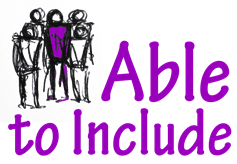The new accessibility layer will be integrated within existing applications and tested to demonstrate its use in 3 different scenarios. Each scenario will benefit from the use of the technologies available through the accessibility layer: simplification of texts, conversion of texts to pictograms and text-to-speech technologies.
Scenario 1: Leisure within the information society
This usage scenario will be applied in three countries (Spain, Belgium and UK) and will be based on the 3 key technologies proposed in this project (text simplification, pictograms translation and text-to-speech) assuring an intuitive communication between users with intellectual or developmental disabilities (IDD) and the rest of society. It will also allow the possibility of direct interaction or chats among the users. This pilot will apply the developed accessibility layer to 3 specific applications (Facebook, Whatsapp and Twitter). The concept is that messages inserted by the users with IDD in the form of pictograms will be translated to simplified text, voice or other pictogram-based language, and the messages generated by other users in text will be converted to pictograms, voice or simplified text, according to the preferences of the user with IDD.
Scenario 2: Mobility
This scenario will be applied in a pilot in Flanders (Belgium) and the UK and will focus on independent travel of people with IDD through the network of public transport. It will make use of the VPad technology developed by partner Thomas More Kempen (TM) and the accessibility layer. Once integrated, the result will be a Smartphone app coupled with a web service allowing:
- To aid the person with IDD during their journey: guidance system with pictograms, voice or simplified text
- To track their location enabling the user with IDD to be located in case they get lost
Scenario 3: Labour integration
This scenario will be developped in Madrid (Spain). It will consist of helping people with IDD in their transition from education to the job market. This scenario will be part of the pilot in Spain, and will be built on the existing teaching program of partner Fundación Prodis for the work integration of people with IDD. Simplext will build upon this effort of integration by facilitating the comprehension of texts and thus easing the work tasks assigned. In order to become a real aid for our target group, the accessibility layer (including text simplification, pictograms translation and text-to-speech) will be introduced into the routine of the future workers at the preparation taking place at Fundacion Prodis.

